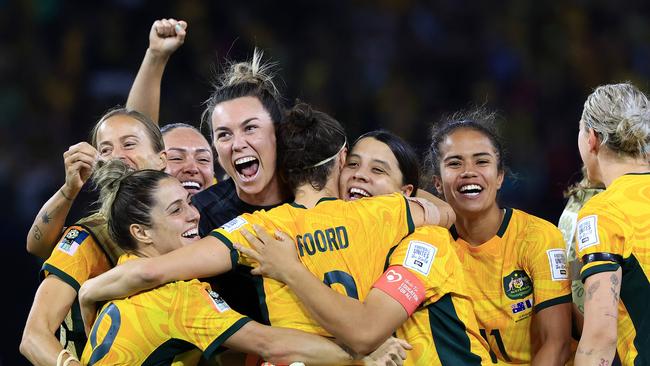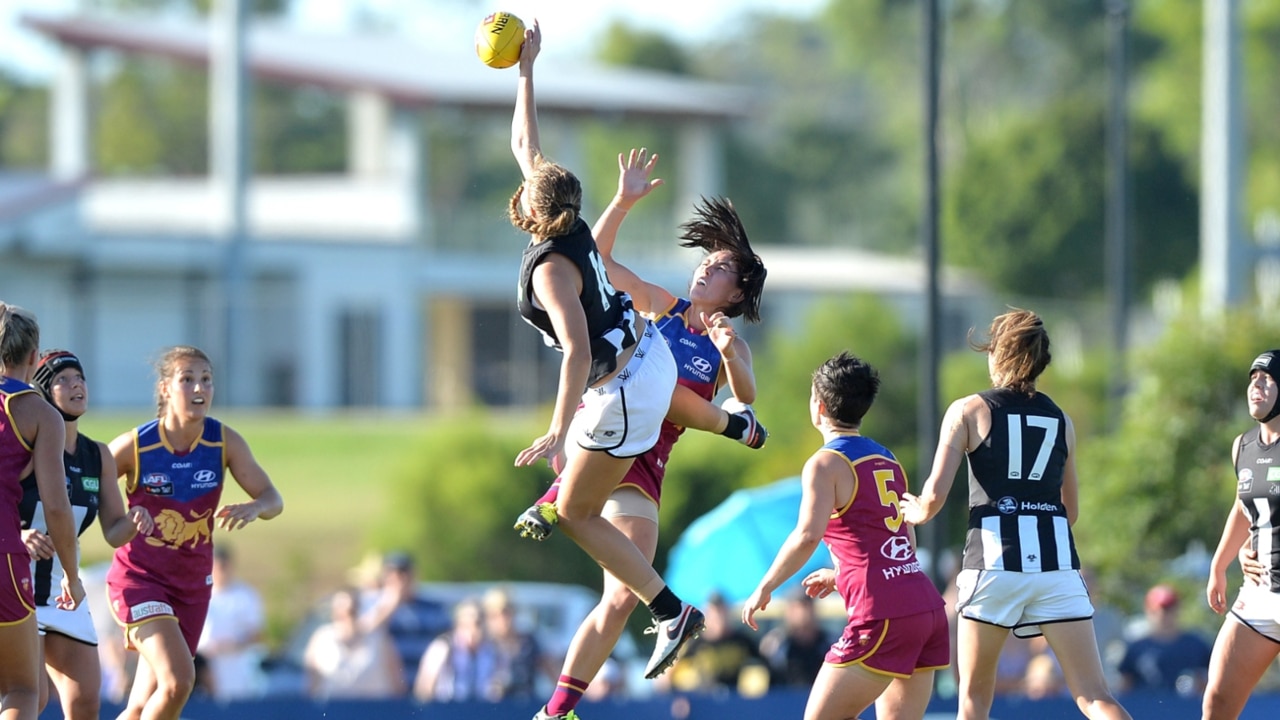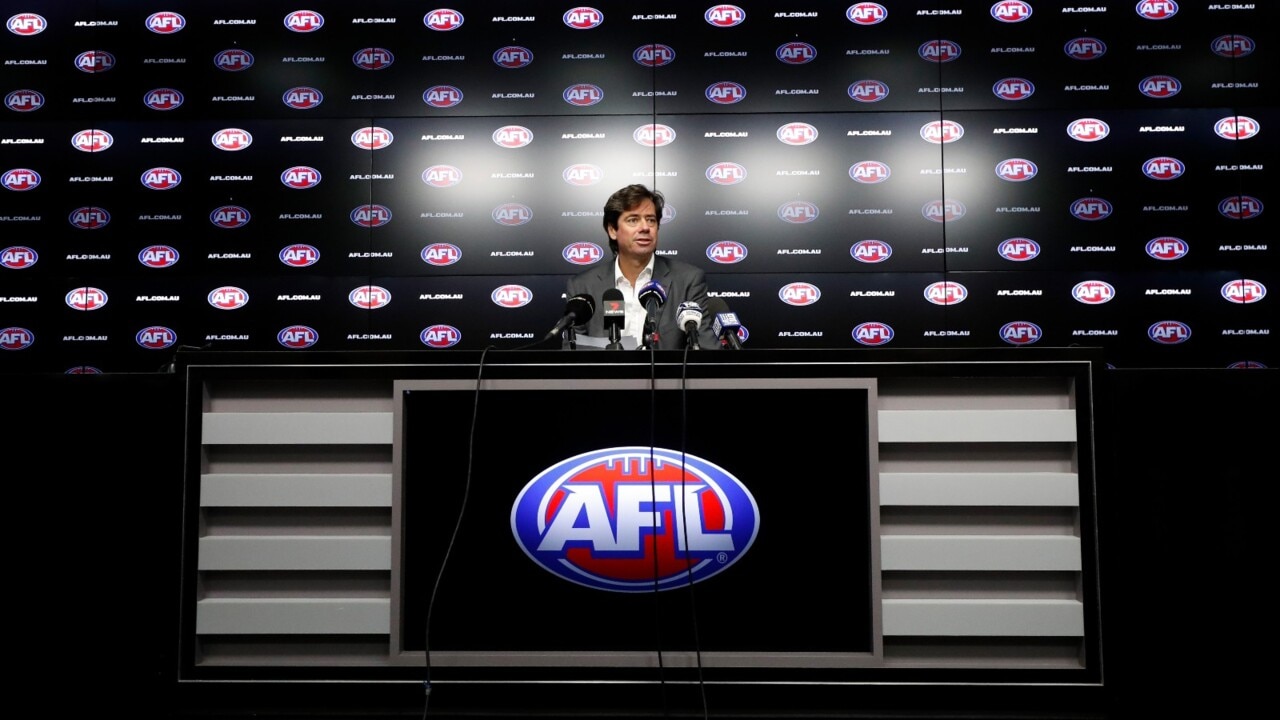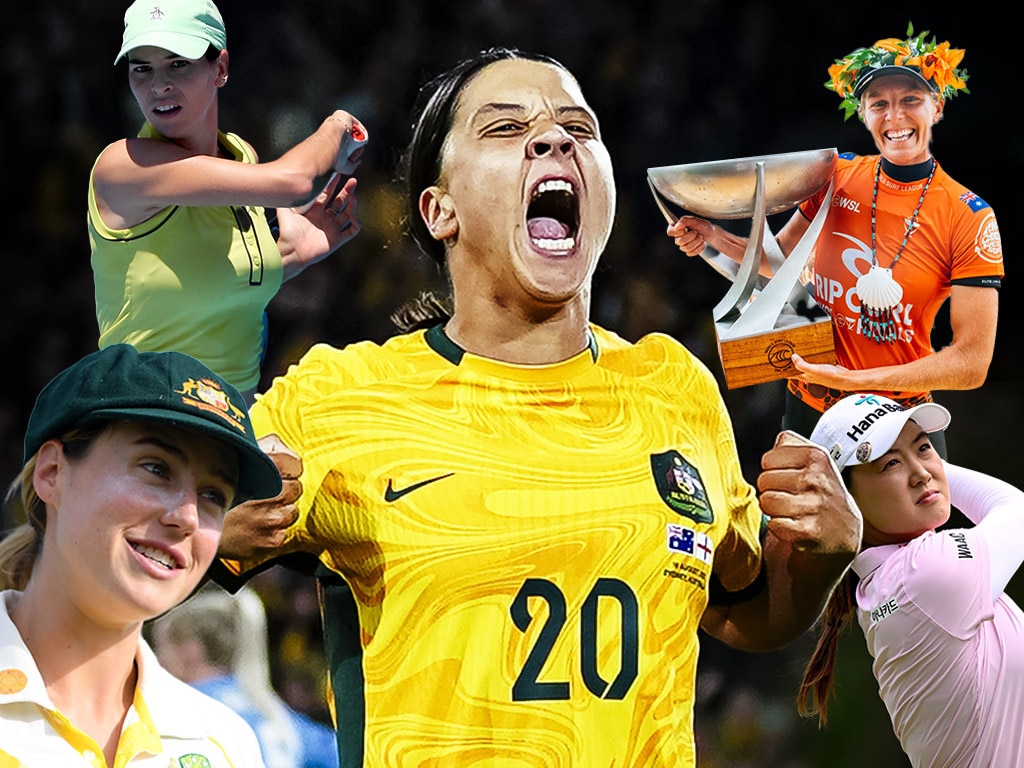After the Matildas’ stunning success, it’s time to end the misogynistic machismo of men’s sport

The Matildas phenomenon – and that is surely what it is, a phenomenon – marks a revolution in Australian consciousness.
Sport is writ large in the national imagination, and sport overwhelmingly has been a male preserve, dominated by men. The largest and richest sporting body in the country, the AFL, has attracted by far the largest crowds, both in attendance and watching on television – until the Matildas.
The AFLW, the women’s offshoot, struggles, with attendance and viewing ratings both falling this year from already low levels.
Hot interest in the recent cricket Ashes was focused on the men’s team and almost entirely neglected the women’s XI. Women’s tennis has advanced in comparative popularity but still falls well short of the men’s game. Women’s golf tournaments hardly register next to the big four major competitions for men.
There have been, it is true, partial exceptions, such as women’s swimming, but they are rare.
Matilda mania is one term invented spontaneously, as the popular imagination struggled to find a concept to catch the euphoria with which these women seized hold of the public mind. The association goes back to 1964, when the Beatles took Australia by storm – and that is the time gap, 60 years. By some weird coincidence, Paul McCartney is about to perform live here, again, in a kind of nostalgic postscript to the 1964 tour.
Back to the Matildas, almost half the Australian population watched their semi-final against England. This is an extraordinary statistic – hitherto unimaginable, unique, something like double the audience for the football grand finals. The Matildas have become a family affair across the nation, and much more – helped no doubt by this being a home series, on TV at child-friendly times, and by the audience seeing the children of players coming on to the field after the match and celebrating with their mums.
As many have commented, Australia fell in love with the Matildas. But why?
The answer, to my mind, is threefold: they are likeable, their play is highly watchable and their demeanour contrasts markedly with that to be observed in the major male football codes, the AFL and rugby.
The players appear to represent the Australian spirit at its best. They come from all around the country, many from small inland towns and communities rather than the big cities. They seem modest, and bubble with unselfconscious enthusiasm about their team and their sport. One is full-on brash, like an excited kid; a few are shy; one a short and tenacious fireball; another fleet and robust; one tiny, fast and sharp in attack; the 20-year-old baby of the team plays like an elusive magical sprite flitting through the opposition; and the tall, acrobatic, grim-faced goalie made miraculous save after save in key victories.

Then there was the captain, Sam Kerr, the only one widely known before this World Cup. Her story in this competition, which she said meant everything to her, was epic: injured before the first match, then sitting with seemingly composed resignation on the sidelines match after match, appearing late in two games to assert some influence but not to any spectacular degree. Against England she scored the team’s only goal, showing her talent, but she missed others and her lack of match fitness showed, and perhaps embarrassed her given her perfectionism.
She displayed singular presence in her dignity, her calm bearing and cool eye on the soccer pitch, her well-spoken maturity at the age of 29, and her personal devastation that the team didn’t win the World Cup.
As far as watchability is concerned, I can speak for myself. I never watch soccer because I find it boring compared with Aussie rules. There may also be a residual patriotism, too, wanting to support the local creation whose only long-term threat is soccer, but that is a minor factor. I am tempted into caricature here: the tedium of men dribbling the ball as they circle each other, repeated endlessly as if stuck in some obsessional neurosis, never scoring, and on and on for 90 minutes, accompanied by laughable staging for free kicks as if they are cast in a Hollywood slapstick melodrama.
With the Matildas’ game there is flair and inventiveness, an unpredictability. And a youthful exuberance, which is almost amateurish, but accompanied by fluent, drilled teamwork, displaying a kind of cheeky, mischievous professionalism that has died out in the major sports. The main tactic seemed to be to let the opposition have most possession of the ball, then break free in speed attacks down one wing. There were brilliant goals seemingly conjured out of nowhere. And penalty shootouts that put the nation on the edge of its seats.
Strangely, the fact the Matildas lost their semi-final didn’t seem to dim popularity, the nation taking that in its stride, as if to say, it’s who you are that counts for us, not whether you are the world champions. And there is admiration for just how good they were and how far they got, given the pitifully little institutional and financial support they receive here compared with affluent European and US teams. Strains here of the old trope of the little Aussie battler, as underdog, taking on the world.
The third and perhaps most significant reason for the eruption of national enthusiasm for these 23 women is the most difficult to chart. It relates to the quite different ethos that emanates from men’s AFL and rugby.
Sport has been secret men’s business from times immemorial, starting with the ancient Greek Olympic Games performed exclusively by men, often naked, for men. Sport, with politics, is one of the two leading male passions in the public sphere. It is what boys dream about; it is what men do; it is what they talk about among themselves. Until recently, sport was a male preserve. However, I suspect the ground may be shifting in public consciousness, with a deeper seismic tremor under the surface suggestive of unease with the predominant male sports as we have known them in recent times – with the tone they set. What the nation has expressed with Matilda mania may well be a desire to break free from old ways.

To make the contrast, let me restrict myself to what is by far the most successful sporting organisation in the country, the AFL. The AFL outperforms all other codes by so far it doesn’t matter. To cite one indicator, as noted by long-time commissioner Bill Kelty, AFL football has more active members than any other organisation in Australia, including unions, churches and political parties. Kelty suggests the clubs are the most significant organisations in the country. Further, the AFL manages to convince governments – federal and state – to spend hundreds of millions of dollars on its stadiums, even though it is incomparably wealthy itself, such is the power of its presence and influence. Compared with this feast, women’s sport scrambles for crumbs from the rich man’s table. To switch reference, the Matildas are David to the AFL Goliath.
But all is not well inside the AFL. Although the game continues to prosper, with the highest crowd attendances ever this year, the tone surreptitiously has changed. The change is seen most starkly in senior management, which has transformed itself during the past 20 years into a “dictatorship” – a word often used according to journalist Mark Robinson, with Kevin Sheedy referring to AFL headquarters as the “Kremlin”, and only half-jokingly.
The extent of this transformation has been meticulously documented by Michael Warner, in his 2021 book The Boys’ Club: Power, Politics and the AFL. Warner’s title says it all. The Boys’ Club catalogues unethical behaviour of breathtaking scope and gall.
For instance, Richard Colless, when chairman of the Sydney Swans, after wooing champion forward Buddy Franklin to Sydney, reports receiving a call from AFL chairman Mike Fitzpatrick and being subjected to 10 minutes of ranting foul-mouthed abuse and being threatened not to report the call or else. Colless replied: “You’re the chairman of the AFL and you’re acting like you’re a mafia don.”

The Swans were punished, losing their special allowance compensating players for Sydney’s high cost of living. Colless was disappointed that not one of the other 17 clubs would support him. It is suggested they all lived in fear of being penalised by unfavourable draws, poor TV slots and restricted access to the best new players if they antagonised senior AFL executives. It’s as if King Henry VIII had forced all the powerful magnates around England into craven subservience.
As an example of bullying, chief executive Andrew Demetriou attacked journalist Chip Le Grand on ABC radio during the Essendon drugs saga, mocking his name and adding: “He’s been wrong throughout the whole Essendon saga … he’s writing garbage.” Le Grand, who had just exposed Demetriou as lying, would write the authoritative book on the Essendon scandal, The Straight Dope.
Former Victorian premier John Cain called the AFL an imperial power, and it wasn’t in praise. Jeff Kennett lamented they didn’t report to anyone, they reported to themselves. They appoint puppets and yes-men to highly paid positions around them, forming a Praetorian Guard that protects the core oligarchy, which pays itself lavishly.
Warner recounts numerous cases of vindictive threat, intimidation, lying and bullying. And a misogynistic culture at AFL headquarters, with one insider recently reporting of the male entitlement culture prevailing there, despite PR rhetoric to the contrary: “It’s an absolute boys’ club … The vast majority of women are still treated like shit and are paid way less than their male counterparts.”
The details of the steady transformation of the AFL into a power-obsessed centralised boys’ club are seen only obscurely by the public. But the broader ethos seeps out like a foul mist dimming the game.
For me, in complete contrast with today’s AFL, the right tone for male sport was set by Richmond captain Jack Dyer. I remember as a boy, and later, listening to Dyer broadcasting football games. In his earlier life as a player, Dyer had been famous for leading his side with courageous vigour – his nickname was Captain Blood. Those were the days of Australian rules innocence, before it turned into a corporate monolith.

As radio commentator, Dyer created a virtuoso storytelling style in a deep, nasal, gravelly voice, combining a Homeric flair for simile with two-minute sentences in which the suspense was steadily built up as clause piled on clause, with the subject of the sentence named only at the end – in the preceding crescendo of clauses it was an anonymous “he”. Dyer would intersperse talk of past moments and players, doing so with tender warmth and nostalgia, evoking for boys like me the sense of heroic past, and love for a mythic game that was bigger than the passing moment. Dyer was a great educator. Above all, it was his character that was admirable: its enduringly memorable tone was one of twinkling good-natured courtesy.
The Matildas and their reception have reminded me of the warmth and affection, the deep love for the game, embodied in this latter Dyer persona, a benign Captain Blood. I am sure I am not alone, although the associations will be different for others.
Times are changing and I suspect there is a misogynistic machismo – a culture of self-congratulatory male entitlement – embedded in the men’s football codes that is starting to irritate the wider public. Enough is enough, with the spectacle of extravagantly paid young men, full of themselves, driving sports cars, drunk in nightclubs, dabbling in drugs and joking as they treat women as crude toys. There is a garrulous matey in-group tone to some TV football commentary that reeks distastefully of the boys’ club – without hint of the Dyer charm.
And there have been the dominant heads of the AFL themselves, often in the public eye, displaying their arrogant, aloof, tough-man, don’t-you-dare-cross-me Kremlin demeanour.
Then came the Matildas. What a breath of fresh air. Perhaps what we have witnessed across the past month has been, in part, a hearkening back to a simpler, more naive and uncynical, more modest and cosier Australia of the past, reborn this time with a female aura.
Also, the nation may be saying that this is how we want our sport, its players and representatives today.
John Carroll is professor emeritus of sociology at La Trobe University.






